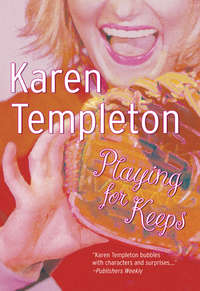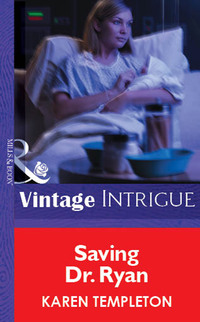
Полная версия
A Gift for All Seasons
***
“Yes, you need to leave,” Blythe had said. “And not return until I’ve finished your suite. Because you hover, that’s why. And I’ve already called Aunt Tilda, told her you’re coming. She’s thrilled.”
Hence, three days later, April found herself staring out of her parents’ Richmond condo at the bleak November sky hanging over a dozen condos that looked exactly like this one. Not that she had any right to turn up her nose, since she’d helped them pick it out. Only she’d never planned on spending any real time here herself.
And, as her mother bustled about in the open kitchen behind her, listening to talk radio at full volume as she made lunch, she remembered why.
She loved her parents, don’t get her wrong. Enough to freak out when her father became seriously ill, to worry when her mother had to quit her job to take care of him, enough to make sacrifices on their behalf she doubted few women her age would have dreamed of making. Even if, at the end, she’d didn’t feel she’d sacrificed all that much. But she’d forgotten how stubborn her mother could be. A propensity inherited from Mama’s own mother, most likely, since nobody could hold on to things—newspapers, margarine tubs, grudges—like Nana.
“It’s a simple invitation,” April said, swallowing down the irritation, the hurt. Fine, so maybe she’d led her mother to believe they were renovating Nana’s house to sell it. Meaning, yes, she’d deliberately kept her parents in the dark about buying out her cousins, about her plans, because April was having enough trouble convincing herself she could make a go of this without throwing her mother’s inevitable disapproval into the mix. So why she’d thought presenting it as a fait accompli would garner a better reaction, she had no idea. Because clearly it hadn’t.
“And you know I can’t set foot back in that house,” Mama said behind her. “I just can’t.”
April turned away from the window, thinking that—from a distance, anyway—with her ash-blond pixie haircut and still-trim figure, her mother looked far younger than she was. “Except it’s my house now—”
“It’s still tainted, April. With all those bad memories …” Her mother shut her eyes, shaking her head. “So many bad memories.”
Although how terrible her mother’s memories really were, April wondered. Lord knew Nana had been irascible and strict, and from all accounts had given her three daughters far less freedom than most children of their generation—prompting all three girls to rebel by marrying men Nana heartily disapproved of. And which, in turn, led her grandmother to cut all three of them off. Warm and fuzzy, Nana had not been.
But while her grandmother might’ve been a pain in the butt, April had no reason to believe she’d ever been out-and-out abusive. And weirdly enough she hadn’t let the rifts between her and her daughters tarnish her relationship with her granddaughters. Not when they were kids, at least. Those summers at the beach house with Blythe and Mel—summers when April could, for six or eight weeks, forget her own chaotic homelife—had been the high points of her childhood.
“I know you and Nana had your differences,” April said gently, “but she and I didn’t—”
“Why, April? Why?” Her mother squawked the last word like her neck was being wrung. “Even if the place weren’t a money pit, which you know it is, for you to, to do this without telling us, to throw away everything Clayton left you … I don’t understand, April. I really don’t. You could have bought any house you liked—”
“Because I don’t want any place, I want this one. I love the Rinehart, Mama,” she said when her mother pursed her lips. “I always have. And now, unbelievably, it’s all mine. My money pit.” Although what she’d spent on the house so far had barely made a dent in the inheritance. Of course, she knew she couldn’t coast on that forever, that if the inn didn’t turn a profit within a reasonable time she wouldn’t be able to keep it going. A worry for another day, however. “Besides, you wouldn’t recognize it now, what with everything Blythe’s done. And especially once the land-scaping’s complete.”
Which, unfortunately, wouldn’t be before April’s return.
Too bad, that. Since, now that April had put some space between herself and Patrick Shaughnessy’s lethal gaze and could look at things with something resembling objectivity, she had to admit two things: one, that she was seriously attracted to the man, which she supposed, given her … situation and the before mentioned lethal gaze, wasn’t really a stretch; but that, two, the timing couldn’t be worse for her to be attracted to anybody.
“No,” her mother said again, shaking her head, and it took April a moment to click back into the conversation. “When your grandmother threw me out, I vowed I’d never return. And I don’t renege on my promises.”
Yeah, back to that stubbornness thing. As witness her mother’s never giving up on April’s father, no matter how many times he’d propose yet another “brilliant” get-rich scheme that inevitably fizzled out, but only after blowing through whatever savings they had. A good man, a kind man, but with the business acumen—and sense—of a gerbil.
So her mother going on about April’s “throwing her money away” was just a trifle inconsistent. That said, at least her parents were still together. Yes, her mother’s intractability about never going near Nana’s house again was annoying as all get-out, but the woman sure knew how to stick to her guns … and stand by her man, no matter what. As she said, she didn’t break her promises.
And neither did April.
Mama carted a plate of sandwiches to the dinette table on the other side of the counter, calling April’s father before setting them down. “And what on earth put the idea in your head to be an innkeeper, anyway?”
“I suppose because I like taking care of people. Feeling useful.”
Her mother dusted her hands, then crossed her arms, censure softening into concern. An unexpected shift that caught April off guard. “I would have thought you’d already done that. More than enough for one lifetime.”
April’s forehead scrunched. “What? Oh. You mean, because of Clay?”
“Exactly. Because …” Mama glanced toward the hall, then lowered her voice. “Because after taking care of your father all those months, I know how hard that must’ve been on you. At the … at the end.”
“But this isn’t even remotely the same thing—”
“And for you to lose your husband so early,” her mother went on, clearly determined to keep this particular train off track, “it was so unfair, honey. Especially since … well.”
Especially since she and Clayton hadn’t had children. But then Mama wasn’t privy to the particulars. Probably never would be, either, it being a nonissue now. Because if she had known … oh, Lord. Woman would’ve had a fit and fallen into it.
And for somebody who considered herself an honest person, April had more secrets than a TV preacher.
Mama cleared her throat. “What Clayton did for us … I still thank him in my prayers every day. Thank God that he was in our lives, even if only for such a short time. He truly was the most generous man on earth.”
“Yes. He was—”
“Then, baby, don’t you think, after what you’ve been through, he’d want you to take things easy? To enjoy life?”
Laughing, April went to the kitchen for a pitcher of tea. “I’m only twenty-six, Mama. Not sure how I’m supposed to enjoy life without living it. To …” She swung the tea pitcher, making her mother suck in a breath. “Embrace unexpected opportunities.”
Her mother hurried over to rescue the hapless pitcher, clutching it to her stomach as she stared at April. “By running an inn?”
“By realizing my dream, of having my own business, doing what I love to do. That’s what Clayton would have wanted for me. And that’s the best way I know how to honor him,” she added before her mother could shoehorn in another protest. Which she did, anyway.
“But it doesn’t make sense—”
Mama clamped shut her mouth as Daddy finally shuffled in from their bedroom where he’d been watching TV, grunting appreciatively at the array of sandwiches before lowering himself into his chair with a contented sigh. Although thinner than he used to be, Edward Ross was otherwise remarkably fit for someone who’d all but rubbed shoulders with death not three years before, even if his entrepreneurial days were in all likelihood behind him. And praise Jesus for that. But what brought tears to April’s eyes was knowing that, thanks to Clayton, her parents’ needs would be met for the rest of their lives. That in exchange for putting her dreams on hold for a few years, he’d now given her the freedom to follow them.
Wherever they led her.
And however scary they were.
A thrill of anticipation shunted through her as she turned to her mother and said softly, “And you of all people should understand that what makes us happy isn’t necessarily what makes sense.”
Another moment or two passed before her mother muttered, “Then you’re as much of a blamed fool as the rest of us,” before carting the pitcher over to the table to pour her husband his tea. Only as April opened her mouth to refute her mother’s statement, she couldn’t seem to shove the words past a certain somebody’s lethal blue gaze.
Lethal … and, unless she was sadly mistaken, needy.
Yeah. What Mama said.
Chapter Three
Patrick saw Lilianna’s face crumple and thought, It’s too damn early for this. And the thing was, the morning had gone reasonably well so far. She hadn’t given him grief over what he’d picked for her to wear—blue tights, green tutu, the first hoodie he put his hands on. Or the scrambled egg and OJ he’d plunked down in front of her while she watched Sesame Street from his sister’s cast-off bistro table in the funky little apartment on the top floor of an equally funky little carriage house in town, not far from his parents. Except then she’d asked for a Toaster Strudel and it all went south.
Because, in his hurry to get the kid fed and over to his mother’s before his crew started wondering where the hell he was, he accidentally let a ribbon of frosting dribble onto the plastic Tinkerbelle plate.
“Baby, baby … it’s okay,” Patrick said over the resulting wail. “Just scoop it up with your finger and suck it off, no biggee.”
“I c-can’t.” Tiny arms clamped over little chest. “You r-rooned it.”
Patrick sighed, knowing the dramatics had far less to do with his sloppy frosting technique than it did Natalie’s in-and-out visit the day before. For hours after his ex’s departure, Lili had clung to him like a little monkey, thumb in mouth, bursting into inconsolable tears when he finally had to put her down to visit the john. To be fair, he knew Nat felt bad about the arrangement, but the support system and Patrick’s job were here in St. Mary’s, and Nat’s school was in Philly, and they’d both agreed Lili needed the stability more than she needed her yet-to-get-her-act-together mother. But how did you explain that to a little kid?
However, even though he hated seeing Lili so miserable, his own mother would smack him into next week for indulging the tantrum. So he squatted beside her at the table and said softly, “Eat it or not, makes no difference to me. But sometimes things don’t turn out the way we want them to.” He cupped her curly head, leaned over to kiss her puckered brow before standing again, crossing to the coffeemaker to fill his thermos. Giving her some space. “All you can do is deal with it.”
Although whether any of that made any sense or not to a four-year-old, God only knew. Especially since he was still feeling his way with this daddy thing. Heck, he barely saw her until she was three, and even then he wasn’t around all that much, since his life at that point still revolved around seemingly endless, and often excruciating, therapies and treatments. And when he was with her, he was constantly battling both frustration and guilt that he couldn’t be the kind of hands-on parent he’d envisioned.
Not to mention husband.
Patrick skimmed a hand over his close-cropped hair—since the burns had eaten half his scalp, there was no point trying to grow out the hair on the side that still functioned properly. No wonder Natalie left him. Not what she’d signed up for, either. Yeah, you could go on about how nobody gets to choose what life throws in their path, but the fact remained that some people handled the crap better than others. That was life, too. So while, sure, it’d hurt that Nat hadn’t been able to cope, neither had he been surprised—
“All done.”
Thermos in hand, Patrick turned to see his grinning daughter holding up her empty plate, pink cheeks smeared with blueberry filling and frosting, and his heart melted more than the frosting. Then he chuckled.
“Guess you were hungry, huh?”
“Yep,” Lili said, giggling, all signs of Cranky Baby vanished. Patrick grabbed a wet paper towel to clean her up, plunked her dish in the dishwasher, then hauled her out of the chair to let her do the baby monkey thing, more determined than ever that nobody was gonna hurt his little girl.
Ever.
Despite his best efforts, Patrick still arrived at the job site after his crew. Good thing, then, he’d reviewed the plans with them well enough that they’d already begun prepping the site, yanking out dead trees and bushes, grading the lot in order to lay the walkways and driveway Blythe and he had codesigned.
Speaking of whom … in jeans and some baggy, drapey thing that made her look like a large blond moth, April’s cousin traipsed across the muddy yard, reaching his truck as he got out.
“Sorry I’m late,” he muttered, grabbing his thermos from the cup holder before slamming shut the door.
“Not a problem, your guys seem to have everything under control.”
Patrick grunted, then said, “April around?”
“No, she’s at her folks for a few days, she’ll be back later in the week.”
He’d been right that Natalie’s visit, and the resulting fallout, had more or less shoved thoughts about April Ross to the back of his brain. Except the minute he got back in his truck after dropping Lili off at his mom’s, it was like the floodgates opened. The whole way out here, in fact, all he could think about was April. In ways he had no right to think about a married woman. It’d been years since he’d been to confession—figuring, he supposed, that since he’d already been through hell, God would cut him some slack—but even Patrick had to admit he’d probably have some serious atoning to do with this one.
So it’d been with a mix of trepidation and anticipation that he’d pulled up to her house, expecting to see her. Hear her voice. See her smile. That light in her eyes that seared straight through him. Gave him, for lack of a better word, hope.
Only she wasn’t here. And for some reason his brain was having a real hard time processing that information.
Which might account for why he then said to Blythe, “Her husband go with her?”
The blonde frowned. “Her husband?”
“Yeah. Not that I’ve ever seen him, but …” He pointed to his own left hand, the base of his ring finger still slightly indented. “Her rings?”
“Oooh.” Blythe pressed her lips together, like she wasn’t sure what to say next. “I forget not everyone knows. April’s husband passed away, Patrick. Several months before she returned to St. Mary’s.”
“What?”
Blythe smiled. Gently. “Yep, she’s a widow.”
And if he’d thought he was having trouble processing things before … “But she’s still wearing her rings.”
“Yeah. She is.” Blythe briefly squeezed his shoulder, then walked away, and Patrick’s brain finally kicked in enough to remind him if there was one thing worse than fantasizing about a married woman, it was fantasizing about one still mourning her dead husband.
There weren’t enough Hail Marys in the world.
Later that week—after Blythe had given her the all clear—a small but potent thrill shimmied through April as she pulled onto the road that led back to St. Mary’s Cove.
Back home.
Wow. What a concept. She’d never fully realized how much she’d always thought of the tiny town in that way, even as a kid. Especially as a kid, when visiting her grandmother’s house each summer had been the only constant in a life that was always starting over.
And now she never had to leave again, April thought as the Lexus purred down Main Street, past quaint shops and quirky cafés, mom-and-pop businesses that somehow kept chugging along despite recessions and suburban sprawl. Unless she wanted to, that is. And, boy, was she done with starting over. As exciting as watching the house’s resurrection had been, she couldn’t wait for it to be finished so she could get on with living. Instead of … waiting. As if her life thus far had been a series of canal locks, and she’d finally passed through the last one before the open sea.
Several minutes later, she squinted as the house came into view, glowing peach in the setting sun, and she spotted one of the Shaughnessy and Sons trucks parked off to the side, like a hulking black bear having a snooze. And, yep, her insides flinched. In that “Oh, goody,” but not, kind of way.
Sigh.
Because although April had nothing against family traditions per se, some of them—like, say, being a blamed fool—really shouldn’t be upheld. Logic kept neatly laying out all the reasons why fantasizing about a certain dangerous-looking landscaper was the bad idea to end all bad ideas. Yet this screechy little voice kept whispering: Screw logic and Go for it and What have you got to lose?
Heh. Good one.
Batting away the whisperings like gnats on a summer’s night, April climbed out of the car … and her mouth fell open. Was that the same yard she’d left less than a week before?
A new driveway snaked around what clearly would be a formal garden, complete with some sort of sculpture/fountain in the center that was elegant and whimsical and cutting edge, all at once. Lots of angles, lots of curves. Copper, maybe? Thin, graceful evergreens flanked the porch, giving way to all kinds of bushes and things she couldn’t even begin to identify. It wasn’t entirely finished, of course—she could see large patches of dirt where she assumed more plantings would go, the beginnings of several stone pathways winding through the flower beds—but what was there was spectacular.
“So what do you think?”
Patrick’s low voice behind her nearly made her piddle her pants. She turned, wondering what it was about the half light that turned dangerous into downright delicious. She didn’t even see the scars anymore—well, she saw them, sure, but she also saw past them. More to the point, she felt him. His presence or aura or whatever the heck he exuded, like a bonfire threatening to consume her.
This was beyond bad, wasn’t it?
“I love it,” she finally got out, fingering her rings as she ripped her gaze from his mouth. “Y’all got a lot accomplished in such a short time.”
“There’s bad weather forecast for the weekend. I was trying to beat it.”
Hmm. Sounded friendly enough, but—she glanced back—no smile, no light in the eyes, nothing. Was it her, or was she the only one here being attacked by the lust demons? Nasty wee beasties. Then again, given the hard time she was having catching a breath, maybe not so wee—
“Daddy? Where are you?”
“Out front, baby.”
A moment later, little footsteps pounded on the porch, down the steps, curls bouncing as a visual cacophony of stripes and florals and a half-dozen colors catapulted into her father’s arms, sending the demons scattering to the four winds.
Although the fire … not so much. True, the warmth shifted north to spread through April’s chest, to the base of her throat. But the ache of seeing him hold his little girl consumed her every bit as much as what, moments before, had produced some very imprudent thoughts. Then Patrick gave April a look over his daughter’s head, not of fear, exactly, but certainly wariness.
Don’t take it as a challenge, don’t—
Mel rushed outside, hair a fright, hoodie unzipped, jeans hugging curves April could only dream of, whooshing out a breath when she saw Lilianna in her father’s arms.
“You little scamp,” her cousin mildly scolded over the little girl’s giggles, and April thought, Huh? “You got away from me! Man, I’d forgotten how slippery little kids can be! April!” A grin spread across Mel’s face. “You’re back! Good! Dinner’s almost ready—”
“We’d better be going, then,” Patrick said as a few more Huhs? pinged around in April’s brain.
“The heck you will, I’ve made enough food for half the town. No arguments. Besides, I’m sure Lili wants to taste the cake she helped bake. Wouldn’t you, sweetie?”
Cue vigorous head shake. Big eyes and soft “Uh-huh.” April melting into puddle of goo. Granted, children had been known to get the goo flowing for some time already, but this one …
“Now how could you possibly say no to that?” Mel asked Patrick, and April thought, How, indeed? And, indeed, the big, buff man holding the itty-bitty girl in his big, buff arms made light of things and said in that case, of course they’d stay. But with definite only because it’s not worth the fight undertones.
Undertones which her cousin either didn’t pick up or chose to ignore. April was betting on the latter. “I’ve been experimenting,” Mel said. “Still getting used to the stove. Ryder should be here momentarily—” And yes, at the mention of her fiancé, her cousin went a bit gooey herself. “He’s fetching Quinn from her piano lesson. Well, just don’t stand there. Come on in.”
So everyone trooped through the enlarged entryway leading into the new-and-holy-cow-improved gathering room. “Blythe said she was sorry she couldn’t be here,” Mel went on, oblivious to Patrick’s decided lack of enthusiasm, “she had some kind of ‘emergency’ appointment back in D.C. But she said to let her know if she needs to change anything in your suite.” Then she grinned at Lilianna. “Hey, cutie-patootie, wanna come help set the table?”
“Yeah, sure,” the little girl said, then wriggled out of her daddy’s arms to bounce off after Mel, while Patrick watched her as though worried she’d vanish through a magic portal into an alternate universe. And wasn’t that cute as all get-out? Although, when puberty came calling? She wasn’t sure who to pity more, Lili or Patrick.
Looking away, April felt the house’s warm glow curl around her, the smells from the kitchen bringing tears to her eyes. A lot had gone on inside, as well, during her absence. Serious miracle worker, that Blythe. April couldn’t wait to get photos up on the Rinehart’s new website, although too bad there wasn’t a way to let potential guests experience the aromas, as well. Tears threatened again. If it hadn’t been for Clayton …
“You okay?”
Not alone. Right. April nodded, clearing her throat, trying to ignore the beasties tiptoeing back. Beasties too dense to realize the man didn’t want to be here.
“If you’d told me four years ago,” she said, not looking at him, “that I’d be getting ready to open my own business, that this place would be mine …” She turned, taking in the refinished floors, the warm colors and inviting overstuffed furniture, the framed watercolors Blythe had bought from a local artist. Sigh. “We really can’t predict what life has in store for us, can we?”
Long pause. “We sure as hell can’t.”
Oh, Lord. Speaking of dense. “I’m so sorry, I didn’t mean—”
“I know you didn’t. It’s okay.”
She hazarded a glance. Met his gaze. Blushed in places she didn’t normally blush, a sensation simultaneously pleasant and unsettling. “You also don’t have to stay.”
Patrick shoved his hands in his pockets, clearly not realizing what that did to the front of his jeans. “There’s a kid in your kitchen who might beg to differ. Not to mention your cousin.” Another pause. “And whatever your cousin’s making is bound to be better than packaged mac and cheese.”










